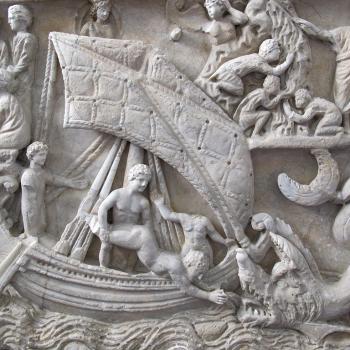So what are we to make of this Haggai? Build the temple, he shouts, and all of your troubles will be over. You will have rich harvests, countless vats of grain and wine, and rest and ease from your fears, if you will only spend your time building the temple. The difficulty of this demand is made quite clear in Haggai 2. "Who is left among you who saw this house in its former glory? (Not too many, to be sure, given that it was wrecked nearly seventy years before.) How does it look to you now? Is it not in your sight as nothing?" (Hag. 2:3) The memory of the glorious temple of Solomon (though its "glory" in reality was far less than the splendid buildings of the mighty Babylon) was shattered in the light of the ruin that confronted the exiles. Attempts to rebuild would be massively difficult, given the economic hardships of a land left in tatters for so long.
But Haggai will not give up. "Yet now take courage, O Zerubbabel, says YHWH; take courage O Joshua, son of Jehozadak, high priest; take courage all you people of the land, says YHWH! Work, for I am with you, says YHWH, according to the promise I made you when you came out of Egypt. My spirit abides among you; do not fear" (Hag. 2:4-5). You see a temple in ruins, the very symbol of YHWH's presence compromised in your sight. To rebuild the thing will be well-nigh impossible. But build, says Haggai, build!
I do not believe, with Haggai, that building a holy building will ensure safety and success. I once heard a sermon from a United Methodist bishop, who used this text in consecration of a new building our congregation had decided to construct, in precisely this way. He said that God wanted from us "nothing shoddy"; great and clean and new structures honored God, he said, and we should be proud. I shuddered as the bishop went on with such words. I do not believe that new buildings automatically honor God. In fact, our pride in the construction of new worship buildings may in certain cases sicken God, as we parade our comfortable prowess before a world too filled with starving children.
Yet, perhaps Haggai was not so simple-minded as I make him out to be. He insisted that the people of Israel, both returned exiles and those who stayed in the land, turn their full attention to YHWH, the God of the exodus whose promises never fail. If I am only concerned with my own house, and give no attention to the house of YHWH, of what use am I to those starving children, those hungry children of this same God? Haggai preaches hope in the midst of hopeless ruin, a future in the midst of a land nearly devoid of one. Can we do any less?
Note: Do not forget the trip to the Baltic Sea, leaving September 3, 2014, where I will be lecturing on the book of Job. I would love to meet you there. For further details of the trip, go to www.eo.travel.





